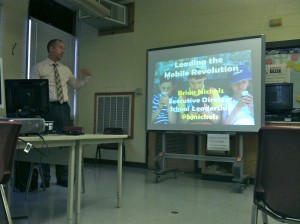Yesterday was a very enjoyable day at New Milford High School, where principal Eric Sheninger hosted The #Edscape Conference. My takeaways:
Laufenberg.
Chris Lehmann‘s travel woes detained him in Chicago, so he was unable to open the conference, but to our great pleasure, Diana Laufenberg stepped up to the plate. Opening with the need to transform learning due to the shift from an information-deficit environment (students went to school to get information from their teachers) to a world where information-overload is the norm, it becomes necessary to embrace a “Less us, more them,” perspective in the classroom. At Science Leadership Academy, students and teachers explore, “How do we learn? What can we create? What does it mean to lead?” through the core values of inquiry, research, presentation, reflection, and collaboration. Diana’s enthusiasm for empowering her students was evident. “We teach kids, not subjects.” She shared with us examples of inquiry-driven student learning experiences. It was powerful to hear how her students spend countless hours (outside of school) ensuring they submit high quality projects and assignments, because they “just don’t want to put crap on the Internet anymore.” Students need meaningful tasks and an authentic audience. They must ask questions, research, share ideas, and be reflective in public spaces. She spoke of the need for transparency and relevance, as well as developing collaborative learning environments that embrace risk-taking and support failure. “If you want innovation and creativity, create a space that allows failure in the learning process.”
Here’s Diana’s TED talk if you have not yet had the opportunity to hear her speak about 3 surprising things she has learned from teaching, including learning from mistakes:
Learning.
Teq helped sponsor the event and offered a variety of Smartboard-related sessions, which I heard were well-attended. Too often schools outfit their classrooms with a specific type of technology, yet fail to provide adequate support and professional development for teachers in order to help the tool be used in order to truly impact learning. I am sure the Smartboard sessions were useful for many. During the first session, I had the pleasure of facilitating a Skype-enabled conversation led by Patrick Larkin and Andy Marcinek from Burlington High School, who shared their experiences implementing a 1:1 initiative with iPads, and also shared strategies for developing ePubs for student and teacher use. They shared a Google doc chock-full of resources: Building a Collaborative ePub.
Over breakfast, Tom Whitby, Adam Bellow and I had a great conversation about how presenters are often fearful they’re sharing the same ideas over and over again, and what if no one learns anything new from what we have to share? I think each of us felt a certain pressure to provide new (or at least tweaked) material at the next conference/workshop/meeting. Then Tom brought up a great point about the amount of educators there are in this world (he threw out the number 7.2 million?) yet, when you stopped to consider the group of teachers & educators that are “connected,” we guesstimated anywhere from 200,000-500,000. So, chances are good that as more people become connected, any ideas you have to share will be new and beneficial to someone just embarking on the connected learning journey.
For that reason, I so appreciated the many folks who stopped by my session. It was wonderful engaging in conversation about the need for educators to share, ideas on how to become a more connected educator, tools to try, and ways that my teachers and students have become connected learners. Afterwards I enjoyed talking to a few attendees with some follow-up questions about Google docs, Wikispaces, and Twitter. I’m so thankful to have the opportunity to touch base with other educators in face-to-face learning environments! Later in the evening I received a tweet from Katelyn, who attended my session and decided to give Twitter a try. She’s a 5th grade teacher – reach out and connect with her! And that’s why I love sharing what I do.
Another great element during my session was the amount of open dialogue. First Aaron Eyler interrupted me (mid-sentence) by broaching the subject of the “virtual high-fiving” in certain Twitter communities. He cautioned the group not to get swept up in retweeting things just because someone who is “high profile” sends it out. He encouraged everyone to read for themselves and determine the value of ideas before freely sharing them. This was an excellent point, and I’m glad he raised it. We discussed that as relationships build via Twitter exchanges, commenting on blogs, etc., it’s important to respectfully push others in their thinking.
Here are my session slides:
Enhance Learning with Social Media
and here’s a link to related resources.
In session 3, Brian always-dressed-to-kill Nichols led a conversation about leadership in the age of mobile learning. He shared examples of student work, admitted freely that he was the kid that always got in trouble in school, and he shared some great apps for mobile learning. Check out his Twitter stream for the great resources he always shares.
I ended the day in a session about innovative teaching and learning. I struggled a bit with the use of the word “innovative” to describe some of the resources shared, and I’m not certain it’s necessary to decipher the differences between technology integration and technology infusion, but I think the fact that these conversations are starting to happen across our schools is an important first step. My final comment to the group during that session is that we have to stop focusing on the tool, and that we have to stop insisting teachers become the experts with technology. We have to focus on pedagogy. Teachers need to be partners in learning. We have to get tools in kids’ hands. We have to help students ask questions, dig deeper, work together to solve problems, and create evidence of learning. And we have to get out of their way.
Due to some scheduling conflicts I was disappointed I didn’t get to hear Paul Bogush or Shelly Blake-Plock speak, as they are two educators whose blogs I read regularly and whose ideas I respect greatly. I regret not having the chance to say hello to Paul, but it was great meeting Shelly for the first time. I missed out hearing David Timony, which was sad, because I always leave his sessions thinking that my brain really is out to get me. (That’s a good thing.) I know there are others I missed…
Laughs.
This was a day filled with positive energy. I was able to share some virtual laughs with Patrick and Andy before their session started. Aaron and Brian kept me on my toes all day, and our post-conference debriefing with Aaron, Adam, Dave Zirkle, Dr. Timony, and Mike Ritzius was full of good cheer. I love these days because I can honestly say some of the most enjoyable times I’ve experienced over the past few years have been in the company of those in my PLN. I’m one lucky learner.
Thanks, Eric, NMHS & students, sponsors, and attendees for an excellent day!

